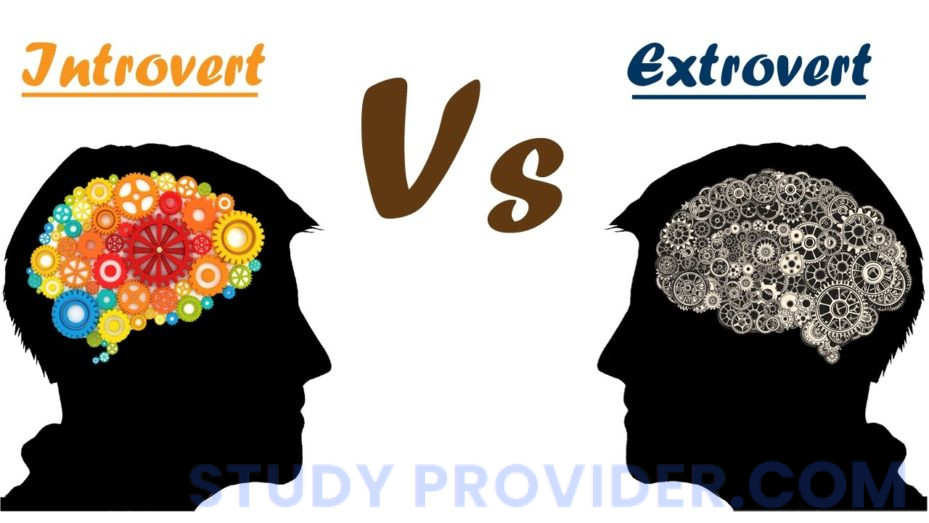Unlocking Your Potential: Transform Yourself from an Introvert to an Extrovert
Introversion and extroversion are two ends of a personality spectrum. While introverts thrive in solitary environments, extroverts draw energy from social interactions.
If you’re an introvert looking to become more extroverted, it’s important to remember that you don’t need to completely change who you are. Instead, you can develop your social skills and become more comfortable in social situations.
In this article, we’ll discuss how to become more extroverted while staying true to yourself.

Self-Awareness
The first step to becoming more extroverted is self-awareness. Understand your introverted tendencies and the areas where you’d like to improve. Identify your strengths and weaknesses in social interactions. By recognizing your starting point, you can set clear goals for personal growth.
Gradual Exposure
Don’t rush the process. Begin by gradually exposing yourself to social situations. Start with small gatherings or one-on-one conversations with trusted friends. As you become more comfortable, you can gradually increase the size of the groups and the frequency of your social interactions.
Active Listening
One of the key traits of extroverts is their ability to engage in active listening. Practice this skill by genuinely focusing on the person you are speaking with. Ask questions, show interest, and make the other person feel valued in the conversation. This will not only help you connect with others but also make you more approachable.
Expand Your Comfort Zone
To become more extroverted, you must step out of your comfort zone. Challenge yourself to attend social events you might have avoided in the past. Try out different activities, join clubs, or participate in group projects. These experiences will help you grow and adapt to social settings.
Build Confidence
Confidence is a crucial aspect of extroversion. Work on building your self-esteem and self-assurance. Practice positive self-talk and embrace your uniqueness. When you feel good about yourself, you’ll be more confident in social situations.
Develop Small Talk Skills
Small talk is often the gateway to deeper conversations. Learn the art of small talk by practicing with friends or even in front of a mirror. Prepare a few conversation starters or topics that you can use to break the ice when meeting new people.
Embrace Vulnerability
Extroverts often open up more readily to others, which can foster deeper connections. Don’t be afraid to share your thoughts, feelings, and experiences with those you trust. Being vulnerable can lead to more meaningful relationships.
Networking
Networking is a valuable skill for personal and professional growth. Attend networking events, connect with people in your industry, and expand your circle. Building a diverse network can help you become more extroverted and open new opportunities.
Join Social Groups
Joining social or hobby groups can provide a supportive environment for practicing extroverted behaviors. Whether it’s a sports team, book club, or volunteering organization, being part of a group can help you feel more at ease in social settings.
Stay Informed
Extroverts are often well-informed about current events and popular topics of conversation. Stay up to date with news and trends, so you can engage in discussions with confidence. This will make you a more interesting conversationalist.
Be Patient with Yourself
Becoming more extroverted is a process that takes time. Be patient with yourself and acknowledge your progress. There may be setbacks, but they are a natural part of personal growth. Stay committed to your goals, and you will see improvement over time.
Seek Professional Help
If you find that social anxiety or shyness is severely hindering your progress, consider seeking help from a therapist or counselor. They can provide strategies and support to help you become more extroverted.
Disadvantages of being an introvert compared to an extrovert
Social Challenges
Introverts often find it more challenging to initiate and engage in social interactions. This can lead to feelings of isolation and difficulty in forming new relationships.
Networking
Extroverts tend to excel in networking, which can be advantageous in both personal and professional settings. Introverts may miss out on valuable opportunities due to a reluctance to actively connect with others.
Public Speaking
Speaking in public or addressing a large audience can be particularly daunting for introverts. This fear of public speaking can hinder their professional growth and limit their ability to express their ideas effectively.
Expressing Emotions
Introverts may struggle to express their emotions openly, which can lead to misunderstandings in personal relationships. Extroverts tend to be more expressive and may find it easier to convey their feelings to others.
Team Dynamics
In group settings, introverts may feel overwhelmed by more extroverted team members. They might struggle to assert themselves and make their voices heard, potentially impacting their contributions to the team.
Risk-Aversion
Introverts tend to be more risk-averse, which can hinder them from taking bold career or life-changing decisions. Extroverts, on the other hand, are often more willing to take risks, which can lead to greater opportunities and rewards.
Social Pressure
In societies that value extroverted traits, introverts may feel pressured to conform to social norms that don’t align with their natural tendencies. This can lead to stress and a sense of not being true to oneself.
Misconceptions
Introverts sometimes face misconceptions, such as being seen as unfriendly, unapproachable, or uninterested in social interaction. These stereotypes can affect their personal and professional relationships.
Energy Drain
Introverts typically require more alone time to recharge their energy. This need for solitude can be misunderstood or seen as a disadvantage, especially in highly social or fast-paced environments.
Communication Challenges
Introverts may struggle to assert themselves and effectively communicate their ideas, which can impact their ability to influence decisions, be heard, or advance in their careers.
It’s important to note that these disadvantages are not universal, and many introverts successfully navigate their lives and careers. Each personality type has its unique strengths, and introverts can harness these qualities to excel in various areas by understanding and embracing their traits.
Advantages of being an extrovert compared to an introvert
Social Ease
Extroverts are generally more comfortable in social situations and can easily initiate and engage in conversations. This social ease can lead to forming a wide network of friends and acquaintances.
Networking
Extroverts often excel in networking, which can be a significant advantage in both personal and professional life. Their ability to connect with others can lead to valuable opportunities and connections.
Public Speaking
Extroverts tend to be more at ease with public speaking and addressing large audiences. This can be a valuable skill in professional settings, allowing them to effectively communicate and persuade.
Expressiveness
Extroverts are more likely to express their emotions and thoughts openly. This can lead to more straightforward communication and a better understanding of their feelings and intentions by others.
Leadership Qualities
Extroverts are often seen as natural leaders due to their assertiveness and ability to rally people around a cause. They can inspire and motivate teams effectively.
Team Dynamics
Extroverts tend to thrive in group settings. They are typically more outgoing and comfortable with teamwork, making it easier for them to contribute actively and lead within a group.
Risk-Taking
Extroverts are generally more willing to take risks, which can lead to seizing opportunities that introverts may be hesitant to pursue. This risk-taking attitude can result in greater career and personal achievements.
Adaptability
Extroverts are often more adaptable to new and unfamiliar situations. They tend to enjoy change and novelty, which can make them more flexible in various environments.
Social Recognition
Extroverts often receive more social recognition and appreciation due to their outgoing nature, making them more visible in social circles and at social events.
Energy Gain
Extroverts tend to gain energy from social interactions and being in the company of others. This can enable them to sustain higher levels of social activity without feeling drained.
It’s important to note that these advantages are not universal, and introverts have their unique strengths as well. The qualities associated with extroversion can be advantageous in specific situations, but it’s equally important to appreciate the strengths of introverts and recognize that each personality type has its own value and contributions to offer.
Some benefits of being an introvert

Deep Reflection
Introverts are often skilled at introspection and deep thinking. They tend to reflect on their thoughts and feelings, which can lead to better self-awareness and personal growth.
Strong Listening Skills
Introverts are excellent listeners. They pay close attention to what others say, which can lead to meaningful and supportive relationships. People often confide in introverts because they feel heard and understood.
Thoughtful Decision-Making
Introverts are known for their thoughtful decision-making process. They take their time to weigh options and consider all aspects before arriving at a conclusion, which often leads to well-informed choices.
Creative Thinking
Many introverts possess a strong creative side. They often excel in creative fields such as writing, art, music, and problem-solving, as their ability to focus on inner thoughts can lead to innovative ideas.
Independence
Introverts tend to be more self-sufficient and can find contentment in solitude. This self-reliance allows them to be productive and enjoy activities on their own.
Empathy
Introverts often exhibit high levels of empathy and emotional intelligence. They can understand and connect with the emotions of others, making them compassionate and supportive friends and partners.
Focus and Concentration
Introverts excel in tasks that require deep concentration. They can work diligently for extended periods, which can be a valuable trait in fields that demand precision and focus.
Stress Resilience
Introverts tend to handle stress well, as they can retreat to a quiet and calming space to recharge. They often cope effectively with life’s challenges.
Strong One-on-One Relationships
Introverts often form strong, meaningful one-on-one relationships. They invest time and effort in getting to know individuals on a deeper level, leading to lasting and profound connections.
Observational Skills
Introverts are often astute observers. They notice details and subtleties that others might overlook, which can be an advantage in various aspects of life, including work and relationships.
It’s essential to recognize that introverts have their unique strengths and contributions to society. While extroverts may thrive in social settings, introverts excel in more introspective and thoughtful roles, making them valuable and important individuals in their own right.
Becoming more extroverted as an introvert is entirely achievable with dedication and a willingness to step out of your comfort zone. It’s important to remember that there is no one-size-fits-all approach to personal growth, and you should always stay true to yourself. Gradual exposure, active listening, and building confidence are key steps in the journey to becoming more extroverted. By embracing vulnerability, expanding your social circle, and staying informed, you can transform yourself into a more outgoing and socially adept individual while retaining your unique introverted qualities. Remember, it’s a journey, not a destination, and with time and effort, you can successfully become more extroverted.
https://studyprovider.com/linkedin-account-benefits/
